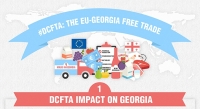
Georgia’s Free Trade Agreements
Georgia is a member country of the World Trade Organization (WTO). It is vital for a small country like Georgia, with a rather small economy, to have international trade facilitations, because it will enhance the economy and the living conditions of the entire country. That is why over time, we have established trade agreements with various countries that will help us in economic development. The free trade agreement is a kind of a guarantee for that.
What does a free trade agreement mean?
A free trade agreement is an agreement between two or more nations to lower import and export barriers. Under a free trade policy, goods and services can be bought and sold across international borders with little or no government tariffs, quotas, subsidies, or prohibitions on their exchange.
How does a free trade agreement work?
In the modern world, free trade policies are often implemented through formal and mutual agreements between participating nations. However, a free trade policy may simply be the absence of any specific trade restrictions.
Under a free trade agreement, the government no longer needs to take specific measures to promote free trade. This arrangement is also referred to as "laissez-faire trade" or trade liberalization.
Governments with free trade policies or agreements do not have to completely ignore all trade rules. In modern international trade, there are only a few cases, within the framework of which the trade is completely uncontrolled and liberalized.
A nation may allow free trade with another nation—but with exceptions, for example—banning the importation of specific drugs not approved by its regulators, or animals that are not vaccinated, or processed foods that do not meet its standards.
Also, a nation may have policies that exempt specific products from tariff-free status to protect domestic producers from foreign competition.
Finally - the key benefit of a free trade agreement is that it reduces or completely eliminates barriers to trade across international borders.
Georgia - part of the free trade agreement mine
As mentioned above, it is particularly advantageous for Georgia to enter into such a deal with as many countries as possible, and the more time passes, the more acceptable and simplified trade we establish with foreign countries.
Georgia has been a member of the World Trade Organization since 2000 and is in free trade agreements with each of the World Trade Organization (WTO) countries. Georgia is also in a free trade agreement with the countries of the Commonwealth of Independent States (CIS) - Turkey, China, Hong Kong, the member countries of the European Free Trade Association (EFTA) and the countries of the European Union (EU).
Georgia signed the Association Agreement with the European Union in 2014, which includes the Deep and Comprehensive Free Trade Area (DCFTA) with the European Union (EU). The European Union grants Georgia the GSP+ duty-free regime for more than 7,000 products. Georgia concluded a free trade agreement with two of the EFTA countries, Norway and Iceland, in 2017, and with Switzerland and Liechtenstein in 2018. An agreement was signed with Turkey in 2008, and with China 10 years later - in 2018.
The GSP regime was also used with the United States, Canada and Japan, which reduced tariffs on 34,000 goods exported from Georgia. Through the US-Georgia Strategic Partnership Commission's Economic, Energy and Trade Working Group, the two countries are working to increase bilateral trade and investment. The two sides signed the bilateral investment agreement in 1994, and since that year, Georgia has been allowed to export many products to the United States of America duty-free - within the framework of the Generalized System of Preferences (GSP) program.
Georgia also has bilateral free trade agreements with Russia, Uzbekistan, Moldova, Kazakhstan, Ukraine, Turkmenistan, Azerbaijan and Armenia. A bilateral free trade agreement involves an agreement between two specific countries to adopt a policy of preferential tariffs and the reduction/elimination of barriers. This agreement involves only two parties and none of its provisions apply to any other nation outside the bilateral free trade agreement. Georgia makes exceptional conditions in the case of Turkey and Russia and has removed several products from the agreement.
Multilateral international agreements on free trade among the CIS countries, except for the Russian Federation, are governed by the Multilateral Agreement on the Creation of a Free Trade Area among the CIS Countries (1994). Georgia is also a member of the Multilateral Free Trade Area Agreement of the Organization for Democracy and Economic Development (GUAM) (2002).
You can find more detailed information about what free trade agreements include and in what form or which products pass through which filter within the framework of these agreements, as well as which specific form of deal we have with any country, on the website of the Ministry of Economy and Sustainable Development of Georgia.
